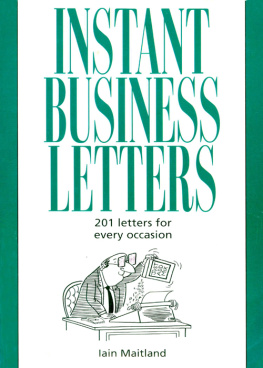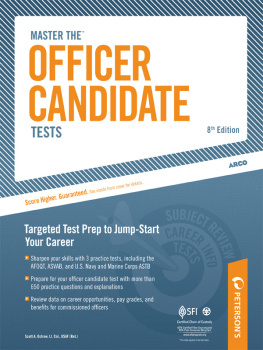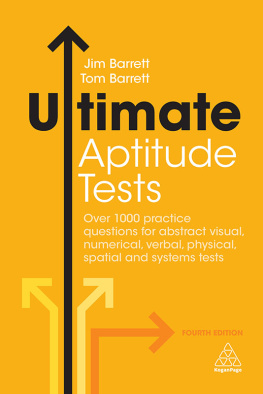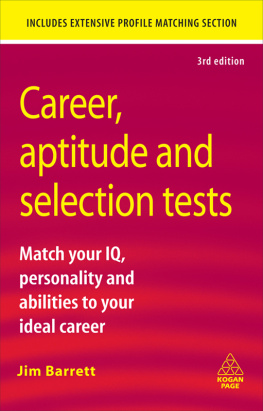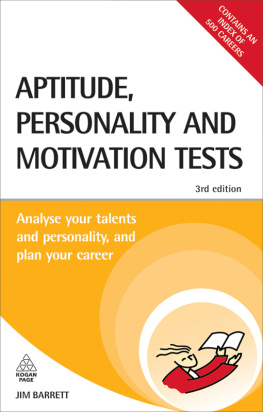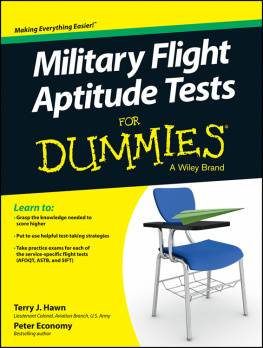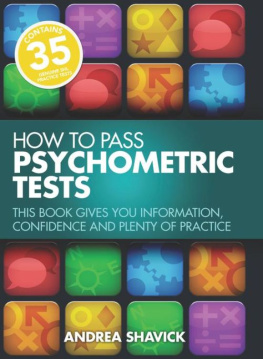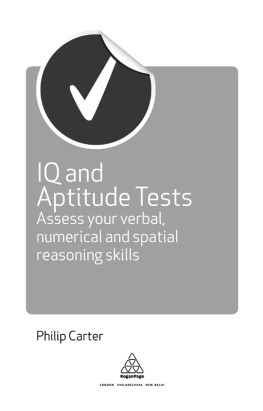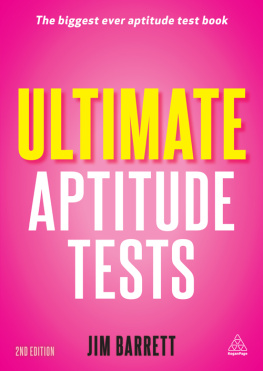
How to Win at Aptitude Tests Paul Pelshenke
I wish to acknowledge the help and assistance of the following organizations and individuals in the compilation of this book: Imperial Chemicals Industries PLC Mensa Metropolitan Police NFER-Nelson Publishing Company Limited, and Robert Feltham in particular Savile Holdsworth.
Whether you are looking for a new job or for a promotion, you may find yourself being asked to take an aptitude test. Not surprisingly, you will want to know as much as possible about these tests. What are they? What do they involve? How can I prepare properly, and succeed? This book answers these questions, and many more. Chapter 1 Understanding Aptitude Tests discusses why tests are used during recruitment, transfer and promotion procedures, and sets out with examples the different types of test that exist, paying particular attention to those for verbal, non-verbal, numerical and spatial ability. It also explains how to prepare for these tests, which mainly involves practising on similar materials under comparable test conditions, and how to sit them successfully.
Chapters 2, 3, 4 and 5 look at each of the leading types of aptitude questions in turn: verbal, non-verbal, numerical and spatial ability. The key characteristics of those questions are detailed and supported by as wide a range of examples as you are likely to face. You can read through these questions for information purposes or even use them as mock tests, subsequently referring to the answers that follow. It is up to you. Chapter 6 lists the answers to all of the questions that were given in Chapters 2, 3, 4 and 5. These answers and, where appropriate, the accompanying explanations not only help you to solve the questions but also to gain a better understanding of them.
Read this chapter carefully. Written in a down-to-earth, authoritative style and supported by illustrations, model questions and answers, tactical tips and chapter summaries, this book contains everything you need to know about aptitude tests, and more. It makes essential reading for anyone who wants to be offered that job, transfer or promotion.
So what exactly is an aptitude test? In theory, it can be defined as a process whereby a persons general intelligence and/or specific abilities are assessed objectively under controlled conditions. In practice, it usually involves a person sitting at a desk providing written answers to a set number of multiple-choice questions in a relatively short period of time. Such tests are used with increasing frequency nowadays, as part of firms recruitment, transfer and promotion procedures.
If you are going to have to tackle an aptitude test (or a series of tests) then you must discover as much as possible about them in particular, why they are used, the different types of aptitude test that exist, and how to prepare for and sit them successfully.
All types of businesses large and small, and across many and varied trades and industries now utilize aptitude tests to help them select the right people for jobs within their organizations. The reasons why tests are used more and more often these days can be understood by considering their benefits. Aptitude tests have drawbacks, too, which we shall also examine.
Benefits
Tests offer several benefits both to the firm incorporating them within their procedures, and to the candidates who sit them. Primarily, they act as an aid when making the selection decision.
The recruitment process in most companies normally comprises a similar sequence of steps application forms are sent out, completed, returned and appraised; interviews are conducted between candidates and a personnel manager (or whoever is responsible for filling the particular job); and referees names and details are given, and references taken up before the final decision is made. Tests simply produce additional, and perhaps different, information to be taken into account and the more information that is available, the better the final decision is likely to be. Aptitude tests are also objective. The results are compared with averages based on the performances of hundreds, or even thousands, of other people who have completed them in the past. Too often, application forms are screened, interviews are conducted and references are read subjectively, with information being interpreted according to personal opinion, and even likes and dislikes. Clearly, a reasoned, scientific approach to selecting people for jobs should generate more accurate and reliable results.
Tests can also provide a fuller, more comprehensive picture of candidates. General intelligence and certain specific abilities, such as being able to see three-dimensional objects from scale drawings, are hard to evaluate by application form, interview or reference alone. Similarly, tests can sometimes confirm the presence (or absence) of other abilities, such as spelling. After all, application forms may have been written with assistance, best rather than realistic behaviour is seen at interviews and references might have been couched in vague rather than clear and concise language. With tests, hard, factual evidence is produced. For businesses, testing helps to reduce the likelihood of the wrong person being chosen for a job, and all of the problems which that entails inadequate workrate and performance, ill feeling amongst employees and, ultimately, dismissal, followed by re-recruitment.
The costs of these in terms of time, effort and money are potentially enormous. For candidates, testing indicates that the firm takes recruitment very seriously indeed, and offers everyone an equal chance to succeed, with the possibility of someone being picked simply because they are a smooth-talking interviewee, for example, being much reduced, or even eliminated.
Drawbacks
Tests do have various drawbacks too in particular, they are a highly specialized and skilled area of activity. Reputable tests take years to be developed, tested and checked to ensure they are both valid and reliable. Valid means that they measure what needs to be measured, and do so accurately. Reliable means that they are free from ambiguous questions that may be interpreted in different ways, by candidates and/or employers.
Those who devise or run other, professionally designed, tests need to be fully trained and experienced if they are to produce meaningful tests and/or results. Otherwise, the likelihood of picking the wrong person is much increased. They are also expensive. As a rough and ready example, if a firm decided to use tests as part of its selection process for filling clerical jobs and approached a test supplier for assistance, it might pay 1500 upwards for one of its managers to attend a training course enabling him or her to administer, score and interpret just one particular test. 200 or more might then need to be paid for manuals, guides, test sheets, answer booklets and scoring charts for 12 candidates to sit that test. Taking account, too, of the time and effort involved in running tests, it is clear that this is a costly exercise.
These drawbacks are outweighed by the benefits. For business organizations, aptitude tests produce valid and reliable results, untainted by personal feelings and guesswork. For people seeking a job, transfer or promotion, the fact that so much money is being spent to get the right person is reassuring.
General aptitude tests, also known as general intelligence and mental ability tests, measure a candidates basic intelligence, often in terms of verbal, non-verbal, numerical and spatial abilities. With a mix of words, symbols, numbers and shapes, the candidate may be asked to find a missing word



